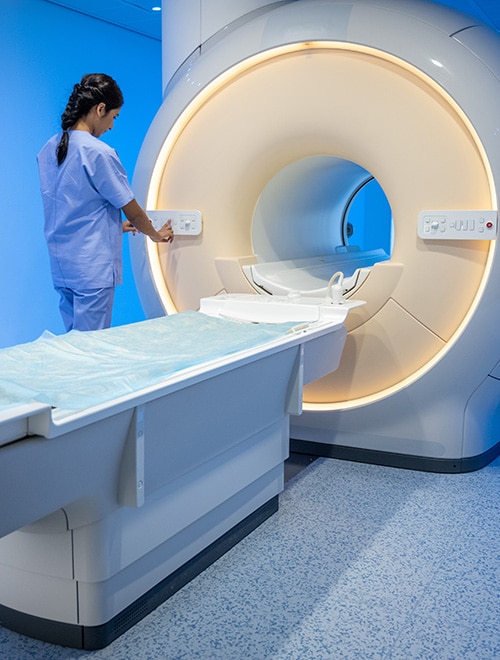- 3 min read
What treatments are new and emerging in prostate cancer?
New medications and therapies for prostate cancer are being developed all the time and are often researched in clinical trials for safety and efficacy before being widely available. Your doctor or healthcare team can advise you whether any new treatments are suitable for you or whether there is a clinical trial that may be appropriate for you.
Focal therapy
Focal therapy is currently an experimental approach that aims to destroy areas of cancer within the prostate using minimally invasive techniques to reduce side effects. Currently, there are several techniques being trialled.
Learn more about these emerging techniques and whether they are available in Australia by following the link to: Focal Therapy
Theranostics
A new and emerging field for prostate cancer detection and treatment is called theranostics.
Theranostics combines the therapy with the testing (also called diagnostics). This allows your doctors to see where the cancer has spread and target your cancer at the same time. This means fewer tests and treatments, with the aim to increase your survival and life expectancy.
An example of a theranostic in prostate cancer combines specialised imaging technology (PSMA PET/CT) with a radioactive compound that aims to kill the prostate cancer.
Follow the links to learn more about PSMA PET/CT scan and theranostics:
Theranostics isn’t a new therapy, but in prostate cancer it’s being researched as a new class of treatments that can help understand your individual prostate cancer and how your cancer is best treated.
Immunotherapy
Immunotherapy is a cancer treatment that works by boosting your immune system to fight cancer.
Your immune system is responsible for preventing disease. It does this by recognising and destroying harmful invaders like bacteria and viruses. Your immune system also recognises cancer cells and is your first defence against cancer. But cancer cells often find a way to prevent your immune system from recognising and destroying them, allowing your cancer to continue to grow.
Immunotherapy for cancer works by either boosting your immune system to attack the disease, or by neutralising whatever is preventing your immune system from attacking your cancer cells.
Immunotherapy is currently approved in Australia for some types of cancers (e.g. melanoma, bladder and lung cancers) and is being trialled for other cancers. Although it’s promising in other types of cancer, immunotherapy has not yet been found to be effective in prostate cancer, but clinical studies are investigating its usefulness in combination with other treatments. It’s currently only available through clinical trials.
Genetic testing
Research continues to give clues as to why prostate cancer might behave the way it does. Sometimes prostate cancers develop changes (mutations or alterations) in their genes that can change how the cancer grows and spreads and may alter the effectiveness of some treatments. Alternatively, you might have been born with altered genes that increase your risk of getting prostate cancer.
Examples you might have heard of are changes (or gene mutations) in the BRCA1 or BRCA2 genes, but there are other possibilities as well. Your doctors might wish to perform tests on your cancer tissue to look for gene changes so they can decide which treatment might be best.
At the moment, these tests are not generally subsidised through the Medical Benefits scheme (MBS), so there might be some cost to you. However, if you have metastatic castration-resistant prostate cancer (mCRPC) you may be eligible for MBS funded genetic testing to determine if you have BRCA1 or BRCA2 gene mutations. Knowing if you have these mutations will influence your treatment options as you may be eligible for a new type of medicine called a PARP inhibitor. Ask your doctor if genetic testing is suitable for you and what costs there are.
Learn more about genetic testing by following these links:
PARP inhibitors
PARP inhibitors are medicines that prevent cancer cells from repairing their genetic material (DNA) so the cancer stops growing.
In prostate cancer, PARP inhibitors usually only work in cells that have a gene mutation, such as in BRCA1 or BRCA2. Clinical trials have shown promising results for PARP inhibitors in a few different cancers including prostate cancer. However, only Olaparib (Lynparza www.healthdirect.gov.au/medicines/brand/amt,807181000168103/lynparza) is available through the Pharmaceutical Benefits Scheme (PBS) for some men with metastatic castration-resistant prostate cancer (mCRPC) and a BRCA mutation. Ask your doctor if this medicine might be suitable for you.
Hormone therapy medications
The development of new or novel hormone therapy medicines is a rapidly evolving area of medical research. These new medications, given in tablet form, work in different ways to existing tablets to block the effects of testosterone on prostate cancer.
There are two types of novel hormone therapy medications:
- Novel androgen receptor signalling inhibitors – these work by blocking the effects of testosterone on prostate cancer cells
- CYP-17 inhibitors – these work by blocking the production of testosterone in the testicles, adrenal glands and prostate cancer tissues
Follow the link to Hormone Therapy to learn about these and other hormone therapy treatments.
Key Points
- New treatments for prostate cancer are being developed and studied all the time
- Focal therapies, theranostics, immunotherapy, genetic testing, PARP inhibitors and novel hormone therapy medications are examples of new and emerging treatments
- Talk to your healthcare team or PCFA nurse about new treatments or clinical trials appropriate for you






